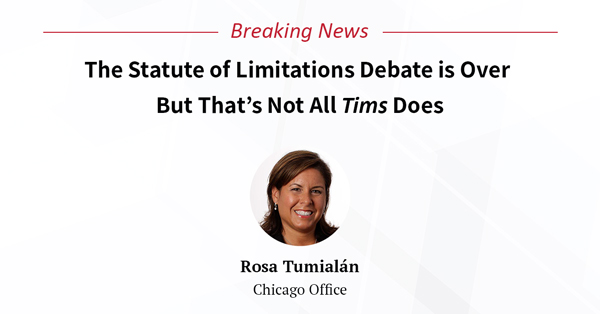
The Illinois Supreme Court issued a much-anticipated opinion in Tims v. Black Horse Carriers, Inc., 2023 IL 127801 on February 2, 2023. Tims settles — once and for all — the burning question of which statute of limitations applies to claims advanced under the Illinois Biometric Information Privacy Act (“BIPA”). Under the appellate opinion, Tims v. Black Horse Carriers, Inc., 2021 IL App (1st) 200563, BIPA litigants were arguably subject to two putative class periods depending on which BIPA violations were alleged. But that is now over. All BIPA claims are subject to a five-year statute of limitations. Period. End of Story. Except in the context of litigating the reach and contours of BIPA for purposes of liability coverage. The full impact of the definitive answer relative to the applicable limitations period will not be known until the Illinois Supreme Court answers the certified question on accrual — a decision just as anticipated as Tims was. But reading Tims as only answering the limitations question overlooks the opinion’s more subtle impact which relates to the ongoing dispute on the availability of insurance coverage.
Tims was not a coverage case. It is instead a case addressing the merits of a BIPA suit in a favorable manner to the plaintiffs’ bar. Plaintiffs will surely view Tims as another victory (for those keeping score, BIPA rulings tend to be plaintiff-friendly) and perhaps it is. That is not the point here. Tims reinforces a critical challenge to Coverage B coverage under commercial general liability policies. The useful nuggets are embedded in the discussion that serves as the premise for the court’s holding.
Briefly summarized, the Tims supreme court opinion held that a single statute of limitations applies to a statute for purposes of consistency and to avoid confusion. The court agreed that the question was whether the one-year or five-year statute applied. The court then examined sections 15(a) through (e) of BIPA to determine which limitations applied. The court’s analysis was driven by the overall intent of the legislature in enacting BIPA (protection of biometric information) coupled with the lack of a stated limitations period. This compelled the court to conclude that application of the five-year limitations period best provided the greatest protection consistent with BIPA’s stated purpose. The court made notable observations that will no doubt be invoked in coverage litigation in reaching this conclusion.
For instance, Tims confirms that sections 15(a), (b) and (e) “contain no words that could be defined as involving publication.” Tims, 2023 IL 127801 at ¶ 30. It was because of the characteristic of these claims that the one-year limitations period could never apply. Id. The court then further agreed with the appellate court that only 15(c) and (d) “could be defined as involving publication . . .” Tims, 2023 IL 127801 at ¶ 31. Significantly, the Tims court cited the definition of “publication” in West Bend Mut. Ins. Co. v. Krishna Schaumburg Tan, Inc., 2021 IL 125978, to make its point. Id. at ¶ 32. This is noteworthy because, while not a coverage case, Tims gives insurers a valuable argument to defeat application of Coverage B coverage.
Publication is a critical criterion of advertising injury coverage. Where there is no publication, there is no advertising injury and no duty to defend. The most prevalent claims asserted by BIPA plaintiffs are brought under sections 15(a) and 15(b). While plaintiffs may now elect to add claims under sections 15(c) and (d), the only change in the coverage landscape is that the (c) or (d) claim now reaches back five years instead of one.
To be clear, Tims does not directly or indirectly eliminate coverage for BIPA claims. The decision instead confirms what savvy coverage lawyers have been arguing since the appellate court issued Tims — the violation a BIPA plaintiff chooses to assert matters for purposes of the coverage analysis.
Insurers can and should advance arguments challenging the publication criterion and its absence from three of the five sections in BIPA. Even where a (c) or (d) claim is included (triggering a duty to defend) challenging the availability of coverage as to the 15(a), (b) and (e) claims introduces a pressure point both with respect to how a plaintiff litigates a case but also how settlement is considered, especially if the coverage issue is teed up in parallel coverage litigation which will also include the updated exclusionary language that has yet to be construed by an Illinois state court.
The Tims decision was long anticipated and finally settles a fundamental question akin to the “aggrieved” issue resolved in Rosenbach. Its impact will be determined as additional rulings construing BIPA is issued. But one impact is apparent now — the publication analysis in Krishna as it relates to BIPA will have to be revisited.
For more information about this article, contact Rosa Tumialán at rtumialan@tresslerllp.com.
About the Author

Rosa M. Tumialán is a partner in the firm’s Chicago office. Rosa is a member of the firm’s Insurance Practice Group and focuses her practice on insurance coverage and bad faith litigation. She is an accomplished defense attorney with nearly twenty years of insurance coverage experience. Rosa’s insurer-related services include coverage opinion analysis and representing insurers in complex coverage disputes relating to personal and commercial lines, third party claims, surplus lines as well as claims handling practices and extracontractual liability. In addition to her reputation as an experienced insurance litigator, Rosa is an equally well-known class action defense lawyer with years of experience in defending class actions filed under the Telephone Consumer Protection Act (TCPA), Illinois Biometric Privacy Act (BIPA) as well as other consumer privacy statutes in both state and federal courts. She is lauded for her ability to develop and employ unique and aggressive strategies for her clients in these evolving areas. She is routinely sought out by companies seeking TCPA and BIPA compliance analysis or those who face TCPA and BIPA liability. Rosa can be reached at rtumialan@tresslerllp.com.